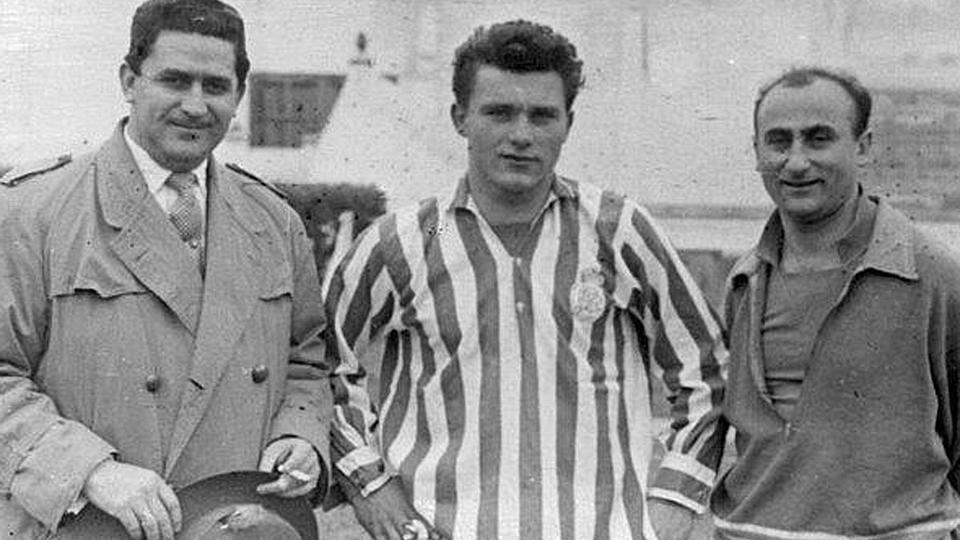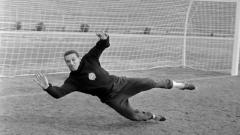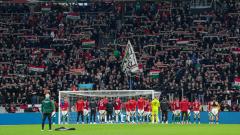Born 100 years ago today: The indefatigable Hungarian who played for Real Madrid

The Budapest native who shone alongside a future Hungarian great at youth level, survived two years in a prisoner-of-war camp against the odds, then recovered to sign for numerous foreign football clubs, one of which would soon become known as the world's greatest. It sounds like the script of a Hollywood movie, but it's rather 'just' another incredible story of a Hungarian footballer making his way in the world. On the centenary of his birth, we look back at the life of György Nemes.
Photo (ealbetisbalompie.es): György Nemes (right) is pictured here in 1958 with new Real Betis signing József Kuzman (centre) and Betis' transfer chief José Benitez (left).
Little is known of György Nemes (Neufeld)'s early years in Budapest but he is reported to have been born on 17th June 1920 in Hungary's capital city. When Nemes reached 13, the minimum age for a Hungarian youth footballer to register with a club, he joined MTK, then historically the most successful club in Hungary, where he would play in the youth teams with a certain Rudolf Illovszky, who would later play for and coach the Hungarian national team and win major trophies as a player and coach with Vasas SC.
A quick and direct winger who was also comfortable in a more central attacking position, Nemes joined MTK's amateur side as he approached adulthood and then their professional team Hungária in 1939, but, in keeping with life for many across Europe at that time, fate was soon to take a shattering, sinister turn.
On account of its Jewish connections, the MTK sporting club was dissolved by the country's authorities in 1941 and its players either banned or released. Nemes was handed a two-month suspension at the start of March 1941, presumably for supposed irregularities with his identification papers which he and others including Illovszky had been required to present to the authorities days earlier, but his hiatus from football would last much longer.
The MTK club was due to give playing opportunities to Hungaria players as part of the club's plan to keep the club's reserve team active in the national second division but those hopes were dashed when its playing licence was revoked on 30th March 1941. In an interview with Nemzeti Sport newspaper on 31st October 1945, Nemes told how he and other sportsmen, including former MTK teammates Vilmos Mérei and József Vidor, were later captured by Soviet troops after the Voronezh breakout.
Between July 1942 and January 1943, parts of the German and Hungarian armies occupied the west part of Voronezh, 500 kilometres from Moscow - Nemes said he and the others had been part of the Kőszegi 214th unit there, so presumably they had been conscripted into the Hungarian armed forces sometime between 1941 and 1942. They were taken to a Prisoner-of-War camp in Morshansk, near Moscow.
A separate account from another survivor stated there were over 15,000 prisoners of war held there, extremely harsh conditions and a typhoid epidemic meaning that eventually only 500 remained alive. Nemes' group suffered terribly, Vidor foremostly because his more eminent football career (at the time) with MTK and Újpest came to the attention of their Soviet captors, Nemes explaining that this information became "oil on the fire".
It's perhaps slightly puzzling then that Nemes also states that the Soviets supported those who wanted to play football in the camp and that the prisoners played plenty of football there on a pitch they built themselves, the Hungarians playing with German, Italian and Romanian footballers amongst other nationalities.
Sport seemed to be a rare distraction from the otherwise hellish conditions though. József Vidor survived for a good while, but didn't make it home, his last words being to Nemes: "If you get home, tell my parents that I thought about them and about Hungarian football until the very last minute". In 1944, Jóska's two former teammates buried him in Morshansk - they would be two of only five survivors from the whole army unit - before later embarking on the arduous journey of several thousand kilometres back to Hungary.
It can therefore be seen as truly remarkable that Nemes managed to return to the professional game at all, let alone at the highest level of club football. This he did though, firstly with his favourite club MTK in late 1945, the 25-year-old right winger saying just before his 'second debut' that: "My heart is racing - understandably. I grew up here and last year this all seemed so far away and unreachable". Nemes was back in style though, scoring five goals in just four matches, including a hat-trick in a 7-0 win against Újpesti MTE (a different team to the Újpest club which has won 20 league titles).
No sooner did life seem to be finally working out for the forward though, that he left Hungary abruptly within six weeks, his head coach Károly Csapkay claiming in early February 1946 that Nemes needed to visit family in Palestine, in particular his brother who was a factory worker, and that a permit to travel had been received, but necessitated him to leave within 24 hours. This would be the last we'd hear of Nemes in Hungary for nearly 40 years.
The truth of what happened to Nemes in the first nine months of 1946 still seems to elude us but what we do know is that he resurfaces at French club FC Sète 34 - possibly via another French side Stade Francais - in the latter part of 1946. Here, Nemes plays on the right wing while his compatriot Dezső Korányi, Szeged-born but a naturalised French citizen who had won the French title with Sète in 1939, played opposite him on the left wing. Korányi actually scored five goals in five matches for the French national team and was so popular with his club that he has a street named after him in Sète. His brothers Mátyás and Lajos were both also talented footballers, both playing for Hungary - the latter being part of the Hungary squad which reached the 1938 World Cup final.
Nemes' playing statistics at Sète are also elusive but he seems to have been there for two years before being replaced by another Hungarian, József Újlaki (who would go on to be a France international and, courtesy of his time at various clubs, the seventh highest goalscorer in French 'Ligue Un' history), at which point he dropped into the French 2nd division with Girondins de Bordeaux in the summer of 1948.
This move would lead to the first of two consecutive second-tier titles in different countries as Bordeaux were promoted to France's elite for the first time in their history in 1948/49 before Nemes left - perhaps ill-advisedly given that Bordeaux became French league champions at their first attempt - to take up an offer at Spanish club Real Santander (originally and now again known as Racing Santander).
There on Spain's north coast, Nemes struck 18 goals in 28 games as Santander secured the Segunda Liga title and promotion to the Primera Liga after safely negotiating a play-off stage. Surely one of the highlights of this season for Nemes would also have been the Copa del Rey round of 16 second leg against the mighty Barcelona, when he scored the opening goal after only five minutes, his team going on to overturn a 4-1 first-leg deficit and thrash their illustrious opponents 5-1 to ensure progress to the quarter-finals where 'Los Verdiblancos' were knocked out by Valencia.
Clearly Nemes was now a world away from communist Hungary, but memories of his playing days at home must have flooded back on 29th June 1950 when his Santander side hosted a special touring team named Hungária, led by a precocious 23-year-old striker named László Kubala. Already an international-capped footballer for both Hungary and Czechoslovakia, Kubala had left the region and jointly formed a football team in Rome made up mostly of exiled footballers from Central and Eastern Europe with his brother-in-law, the coach Ferdinand Daucik.
Hungaria were near the end of a five-week tour of Spain which would culminate in Kubala signing for Barcelona when they arrived at the Campos de Sport for a gala friendly to celebrate the home team's league promotion. According to Spanish sports historian Raúl Gómez Samperio, 'Jorge' Nemes was visibly emotional as he welcomed his compatriots on to the pitch, among them his former MTK teammate from late 1945, István Turbéki, ahead of a fine encounter which the hosts would win 4-2.
Kubala was to get his dream move a couple of weeks later but a big move was also to soon come Nemes' way. Surely a call from Real Madrid must have been unlikely so, already aged 30 years old, Nemes must have been ecstatic to be approached by club president Santiago Bernabeú and the club's English head coach Michael Keeping.
Alas, surgery for a stomach ulcer and a broken leg meant that Nemes only played for Real once in season 1950-51, a 6-2 away defeat at Real Sociedad, but it's worth noting that also in the Real team that day was Miguel Muñoz, the midfielder who less than ten years later would be the coach of one of Hungary's greatest ever footballers, Ferenc Puskás, as he achieved perhaps the greatest individual feat in European football history, those four goals in the 1960 European Cup final for Real against Eintract Frankfurt in Glasgow.
Real decided to let Nemes go in the summer of 1951 and although he joined another Primera Liga club in Hercules, his ended his career without making an appearance for his final football club. Not much is certain about Nemes' next moves but it seems that he may have worked as both a journalist and a scout for clubs hoping to sign Hungarian immigrants.
József Csóka credited Nemes with involvement in his successful transfer to Atlético Madrid in 1957 and a year later the still-only 38-year old helped Real Betis sign the exciting József Kuzmann, who would become Betis first ever foreign player and serve the club admirably for the next six years. Nemes, meanwhile, reportedly became involved in a property company in Alicante, whilst retaining links to football. Indeed, Népsport newspaper's correspondent Endre Tabak even took quotes from Nemes at half-time of Spain's 1964 UEFA European Championship semi-final against Hungary in the Berbabeú stadium in Madrid.
Little more is known of Nemes from this point onwards but he is quoted again in Népsport 20 years later in 1984 and in 1985, the latter occasion being when he acted as Real Madrid's interpreter during their trip to Székesfehérvár for the 1985 UEFA Cup final first leg against Videoton. A football-lover with a truly remarkable history inside and outside of game, Nemes is reported to have passed away in 1988.
*Please note this article will be updated as more verifiable information comes to light.
A hírkategória további hírei
2026-02-12 23:09:33
UEFA Nations League: Hungary drawn with Ukraine, Georgia and Northern Ireland
2026-02-04 18:29:57
Gyula Grosics was born 100 years today
2026-01-31 00:12:06
Europa League: Fradi to face Ludogorets of Bulgaria in knockout stages
2026-01-23 16:46:56











